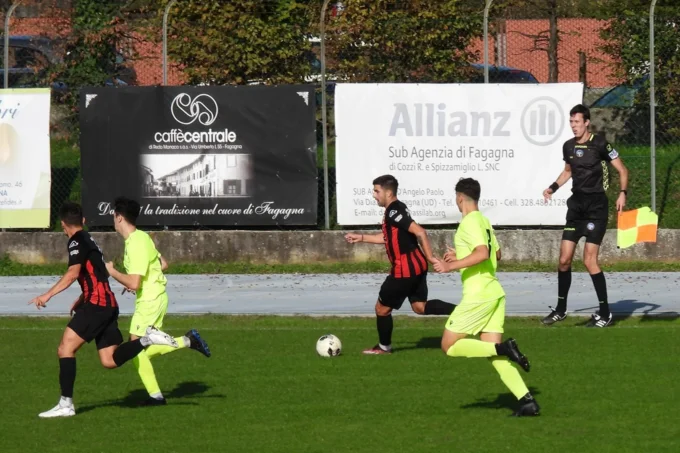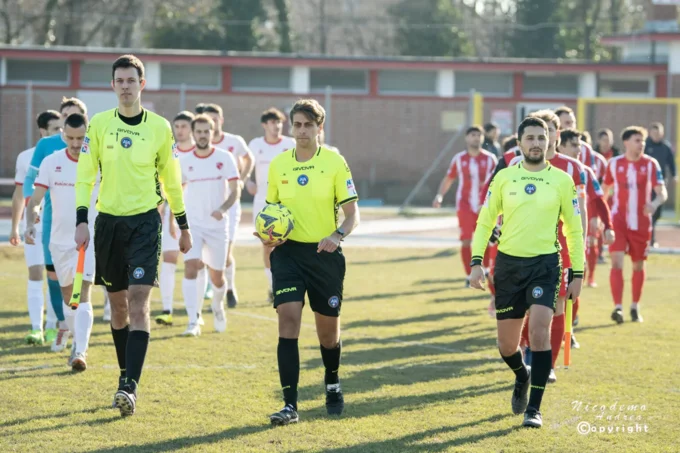What's up: Inside the football refereeing

In this month’s What’s up student Column our EUSA European Solidarity Corps volunteer Mr Jan Hussu shares his views and experiences on the topic of football refereeing.
When we talk about referees, the conversation is often critical. Referees play a crucial role in enforcing the rules of the game, deciding in less than one second and sometimes making unpopular calls. Many fans, players, journalists, and coaches don’t fully know what goes on behind the scenes in match officiating. As a football referee in Italy’s top regional league, I would like to share some insights into the world of football refereeing.
With football evolving to become faster and more intense, referees have had to become professional athletes. Many professional referees train daily, either alone or with other referees, focusing on endurance, power, speed, agility, and coordination along with fitness sessions. Alongside physical preparation, referees must have a deep technical preparation of the game's rules. They are in a constant learning process, attending seminars on a weekly or monthly basis to stay updated with new guidelines, analysis of current situations, and recent match episodes. These sessions help referees to strengthen their skills, build team cohesion and prepare for upcoming matches. To officiate, referees also must pass physical fitness tests and quizzes on game rules on a weekly, monthly or semestral basis.

During matches, referees communicate with each other through headsets or coded signals. The referee crew match performance is assessed by a former referee who acts on the duties of a referee observer. The evaluation of the referee team's performance focuses on aspects such as physical performance, technical performance (such as fouls), disciplinary (card-issuing) actions, and overall behavior. After the match, the referee crew and observer or a referee commission member (if present) discuss the match management and potential key match incidents that occurred during the match. The observer or/and commission member then rates the referees (usually in numerical letters) from “deeply negative performance” to “excellent performance”. These ratings contribute to creating the referee's internal ranking, which helps to determine and influence possible promotions to higher leagues (including the international list), relegations, demotions, and appointments to important matches.
Referees receive financial compensation, but it varies by country. In many countries, even top league referees are considered amateurs or semi-professionals working on part-time or on-call contracts with fixed yearly compensation plus per-match pay. Often this compensation is insufficient for referees to be financially independent, so most of them have additional jobs. However, in the English Premier League, referees are full-time employed (professionals) by a dedicated referee organization, with benefits including health insurance, social security, personal trainers, referee coaches, physiotherapists, and psychologists who support their development throughout the season.

Unfortunately, discussions around referees are often negative. When a team is underperforming, referees become the easiest target for insults, verbal abuse, and sometimes even physical threats. It’s important to remember that referees are human and, like can commit mistakes. While spectators can watch matches on TV and from different angles, referees rely only on their direct line of sight to decide in less than one second. The introduction of the Video Assistant Referee (VAR), allows referees according to the VAR protocol to review key match incidents from different angles and potentially overturn the decision. The VAR introduction reduced the number of mistakes, but instead of increasing acceptance, it often fomented media and fan criticism, as blame is still placed on referees.

Being a referee is an extremely important and challenging role, that demands professionalism, resilience, quick decision-making, and the ability to stay calm under pressure. Despite their crucial role in ensuring fairness and integrity in the game, referees often work under intense scrutiny and criticism. Perhaps it’s time to acknowledge the dedication and skill that goes into every call they make, recognizing that, in the end, referees are there not just to enforce the rules but to uphold the spirit of the game we all love.
This What's up column is written by Jan Hussu, a 25-year-old guy, coming from Trieste (Italy) with a master’s degree in Sports Management. Currently, volunteer at the EUSA Office in Ljubljana, and in my free time assistant referee for the Italian Football Association, officiating in the Italian top regional league.
Are you a student with an opinion? We are looking for new contributors for our student column every month. Feel free to contact stc@eusa.eu to offer a piece or propose a topic.
